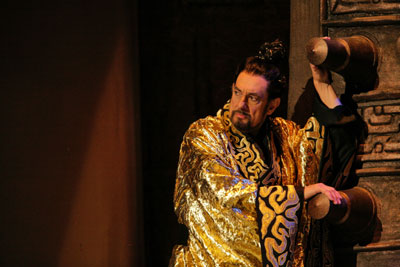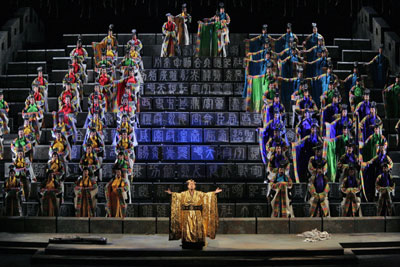|
If Gertrude Stein were alive today to ponder the creative issues behind The First Emperor, a new opera with music by Tan Dun and libretto co-written by Ha Jin and Tan Dun, she might say that the storywriters had identity problems that got bollixed up with human nature and landscape. Perhaps there was also a little taint of money involved.
THE STANDARD: ONLY ONE IN A GENERATION
The Steiny Road Poet offers background on the opera first:
She loved Tan Dun's textured music made with stones, exotic instruments including waterphones, the full classical orchestra; Chinese film director Zhang Yimou's grand scale mise-en-scene (don't miss his new film Curse of the Golden Flower if you love color and image); Emi Wada's costumes; the dancing of Dou Dou Huang and the stylized movements of the Ying-Yang Master; and the fine performances of Plácido Domingo (The Emperor), Elizabeth Futral (Princess Yueyang, the Emperor's daughter), Paul Groves (Goa Jianil, the composer), and Hao Jiang Tian (General Wang to whom the Emperor has betrothed his daughter). Catch her full review at culturevulture.net.

Here's what Gertrude had to say in The Geographical History of America or the Relation of Human Nature to the Human Mind:
"There are a great many people always living who are mixed up with anything and that is known as events.
But.
Only one sometimes two mostly only one sometimes none but certainly mostly only one in a generation can write what goes on existing as writing."
The Poet is positive there will be Stein scholars who will be annoyed about how she chooses to interpret Gertrude here, but she find this quotation a good jumping off point. Events conspired to bring National Book Award winner Ha Jin into Tan Dun's Metropolitan Opera commission. Ha Jin originally said no to this project because he did not wish to glorify the tyrant Qin Shi Huang, the warlord who unified and codified laws, measures, and language; who created the magnificent terracotta army and who became the first emperor of China through acts of cruelty and might. (For more information on how The First Emperor came about, visit the Scene4 blog called The Dressing.) Although Ha Jin joined the Chinese army when he was 14 (he was a soldier for five and half years), he came to the United States for his college education and never left. The Tiananmen Square massacre made him and his wife decide that they wanted to raise their son in the U.S. After Ha Jin said no to the project, Tan Dun got on a plane to Boston to explain to the reluctant librettist that the story would not glorify Qin. How could Ha Jin say no to an artist who had been sent away from his city life during the Cultural Revolution to be a rice farmer? How could Ha Jin say no to the money offered? He has family to support after all.
WHOSE STORY IS THIS ANY HOW?
The major criticism the Steiny Road Poet has leveled against The First Emperor is that the story seems either slight—a man about to ascend the throne as the first emperor of China demands that his childhood friend write an anthem for his coronation—or misfocused—the emperor's willful daughter refuses to marry the emperor's favored general because she prefers her father's childhood friend the composer. Could it be that the way both Ha Jin and Tan Dun identify with their homeland has stood in the way of their artistic choices? According to commentary on The Geographical History of America or the Relation of Human Nature to the Human Mind by noted Stein scholar Ulla Dydo, Stein saw America as a landscape so large that it opened up American writers' imagination. Still, like Ha Jin and Tan Dun, Stein felt stifled by the culture and politics of her country so she chose to live and work in France.
Because Ha Jin has kept a low profile in regard to The First Emperor (he seems to be absent while Tan Dun is omnipresent) and because Ha Jin has gone on record saying he has been influenced by William Faulkner, Chekhov, and Tolstoy, the Poet guesses that Ha Jin just offered whatever poetic touches he could, but let Tan Dun lead the way on this story. What is missing from the story of The First Emperor is a new interpretation of the human condition along the lines of what Faulkner, Chekhov, and Tolstoy achieved. Sure, we see a man who is responsible for the deaths of those he loved the most and because Plácido Domingo is a great artist, not only as an operatic singer but also an actor, the audience for The First Emperor should walk away feeling mostly satisfied. But when the curtain closes, the story is still about an emperor who wanted an anthem worthy of his coronation.

In Stein's Geographical History, she says human nature which is defined by what a person does might be "occupying" but it is not interesting, especially to a public audience. Furthermore she says that which is written down that has to do with remembrance is not interesting. Great writing is the human mind in relationship to the universe. Perspective is what makes a difference such that "flat land is not romantic" but more interesting is "flat land as seen from above." (Think about viewing the Earth from airplane as Stein did in 1934 when she flew to Chicago so she would not miss seeing a production of her opera with Virgil Thomson Four Saints In Three Acts.) What Stein learned from her Harvard professor William James was that which is habitual is NOT the stuff of genius. So Tan Dun did not need to recount the tyranny of the emperor Qin, but some how the team of Ha Jin and Tan Dun trivialized their supposed protagonist, making the story focus more on Qin's daughter, the princess Yueyang.
|
